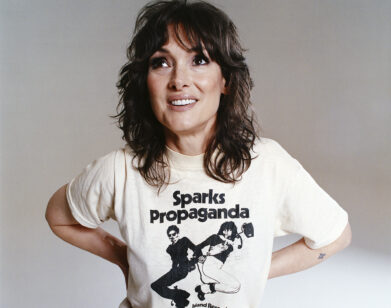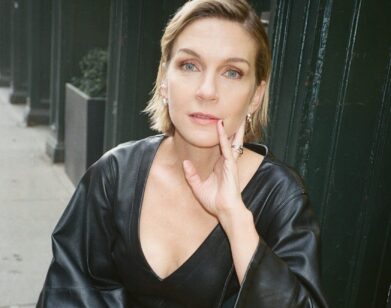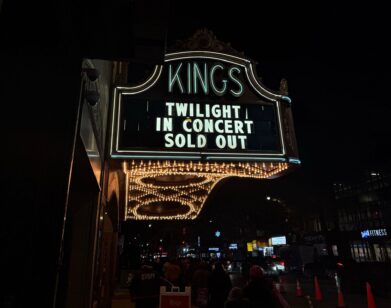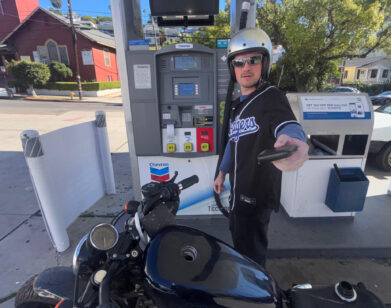Meera Menon and the Women of Wall Street
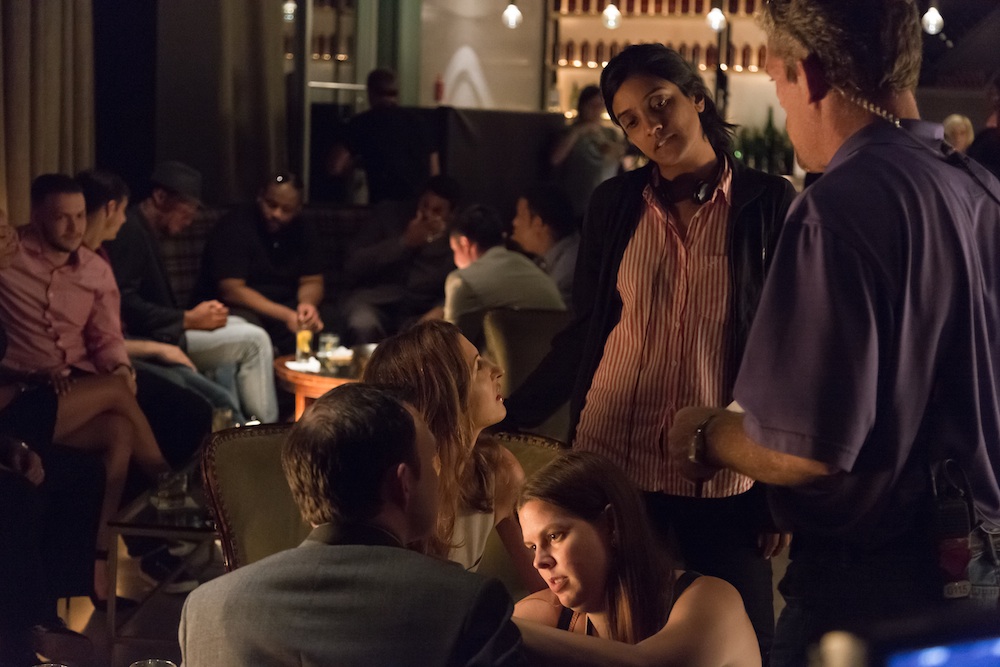
ABOVE: MEERA MENON ON THE SET OF EQUITY.
“Don’t let money be the dirty word,” counsels Naomi Bishop (Anna Gunn) to a room full of young women in Equity. “We’re allowed to like that too.”
Equity isn’t really about money, though; it’s about power, ambition, morals, and gender norms. It’s about what it takes for a woman to succeed in a field dominated by male egos. Described by some as “the first female-driven Wall Street film,” Equity follows three women wrapped up in the financial industry. There is Naomi, who underwrites IPOs at a large bank; Erin (Sarah Megan Thomas), Naomi’s right-hand woman and vice president; and Samantha (Alysia Reiner), Naomi’s former classmate who is prosecuting white collar crime at the D.A.’s office. Each woman has her own agenda, and the line between looking out for oneself in a dog-eat-dog world and sabotaging others is increasingly opaque.
Directed by New Jersey native Meera Menon, whose first film Farah Goes Bang debuted at the Tribeca Film Festival in 2013, Equity co-stars James Purefoy and Samuel Roukin. Although Amy Fox wrote the script, it was actors/producers Thomas and Reiner who first conceived the idea. Sony Pictures Classics acquired Equity just before its Sundance premiere earlier this week.
EMMA BROWN: When they approached you to direct Equity, was it because of your first film? Did you have to campaign for the job at all?
MEERA MENON: They hadn’t seen my first movie, but I was recommended to them by someone who I had worked with on my first movie. His name is Mark Stolaroff, a producer that runs the No Budget Film School in L.A. He really counseled me through the process of making my first film, which was made for no budget. They definitely had a mandate to find a female director, which I think is so commendable and important, but they were talking to a lot of directors. When they approached me it was very quick. I read the script instantly and knew what they were going for. I really liked them and I presented my take on it, how we could lift it off the page and turn it into a movie, and they responded to it pretty immediately.
BROWN: Do you have any personal experience with the Wall Street world?
MENON: Not personally. When I was in film school at USC, I wrote my thesis script about a woman on Wall Street—specifically a woman who used to work at Morgan Stanley, sort of based on her life. Through that process, I did some research. But she worked in sales and trading, and for this movie I had to really understand the world of investment banking, which is separate and very different in terms of its mechanics.
BROWN: What made you want to write your thesis script about women who worked at Morgan Stanley?
MENON: I think it was the same thing that really makes the premise of this film compelling: the idea of a woman negotiating issues around power and money, which are two things that have historically been denied to women. To see a woman operate successfully, but still find those barriers a result of that historical and systemic bias in her pursuit to the top, is a really interesting struggle. Through this experience, I recognized what an extraordinary set of personality traits it takes to be able to succeed in that world, and I was really drawn to the character work we could build with actors as a result.
BROWN: I found it quite demoralizing listening to the amount of bullshit women like Naomi have to say to the men surrounding them.
MENON: Yeah. One of the things that the film really explores is how—and this is really in any industry where there’s salesmanship—if a woman comes off too tough, she’s thought of as a bitch and if she comes off too nice, she comes off as weak. You can’t win. Either technique you employ to succeed in the business world, you’re tagged as something. There are so many negative tags that get associated with a woman in that role.
BROWN: Were Alysia and Sarah were always going to be in the film?
MENON: Yeah, that’s how they had developed it. They had developed it as actresses that wanted to produce and create an opportunity for women behind the camera, but also an opportunity for themselves to portray strong, complex female roles that they didn’t see available in the landscape of the film and television industry.
BROWN: What about Anna Gunn?
MENON: Anna came into the process after I signed on. She read the script and instantly understood the main character. The first time I met Anna, I basically listened to what she had to say about the character and she was saying everything that I had been thinking. Our brains were immediately in sync on it; I think she understood it at a deeper level than even I did. That’s what you’re really looking for, an actor that can lift the character to a place that you had never even imagined. And she’s the most honest person and most thoughtful actress that I’ve ever encountered. I had sensed that was the case from her previous work, that little-known show Breaking Bad, but it was absolutely the case. She’s particular about what roles she goes for and we were able to have those extraordinary conversations that a director dreams of having with an actor—an in-depth exploration in who this person is and where they come from and what makes them tick.
BROWN: I was interested in her history of her relationship with James Purefoy’s character. You are given some information, like that they actually met a long time ago in the late ’90s and that he was married at one point.
MERON: That’s really what’s extraordinary about Amy’s script. There are these little flourishes that signal to you the backstory of these people and made you wonder what’s going on there.
BROWN: At the end of the film, it seems some of the characters have gotten away with their actions. Was it important to you that a woman was allowed to transgress without being punished for it? Was that something you thought about?
MERON: It was an element wired into the script that I found really fascinating. As I read it initially, you weren’t sure who the antagonist was, who was going to be Naomi’s main obstacle in getting what she wanted. It ended up being the person who she should have been able to trust the most.
The film had many endings and that was the one we eventually settled upon. We realized that kind of leaning into the darkness—where ambition gone wrong, or competition gone wrong, can impede progress and work against the agenda of shattering the glass ceiling—was the stronger and more stirring choice to make. But there were definitely other endings that were more positive, more uplifting. We shot all of them.
BROWN: Film is often described as a director’s medium. What’s it like when you are directing the people who conceived the idea for the film and are also producing the film?
MENON: It was a very collaborative process, for sure. I was brought on to the project to be in service to the story and the script. The next step in that collaborative process was Sarah and Alysia stepping in front of the camera and me earning their trust, such that they, knowing the story better than anyone, were into me taking the reigns for that period of time. I think it was a lot about trust building.
BROWN: Did you watch a lot of films growing up?
MENON: I did. My dad is an engineer by trade but worked a lot with the people in the Indian film industry when I was growing up. He started out distributing films from India here in the ’70s because there was no place to go for people to watch movies from the homeland. So he developed a network of actors, writers, directors, and musicians that became his friends and that he would tour around the country with, doing stage shows of the musical numbers from their films. These were the kind of people in my home growing up. I grew up backstage at these shows in awe of them and really drawn to the excitement and energy that those kind of artistic people can provide. I think my life was a search to be around those people because I just find them exciting.
BROWN: Were your parents happy when you told them you wanted to go to film school?
MENON: Well, they’re immigrants and I was a first generation kid, so there definitely were concerns about the viability of my career. My father said, “Keep it as a hobby,” because that’s what he did all his life. He had a steady nine-to-five job working as an engineer and this was something he did on the side. At the same time, they understood that growing up as his daughter, I was inevitably going to become somewhat interested in this world. [laughs]
BROWN: USC is a great school, but did you always know that you wanted to go there?
MENON: No, not at all. I grew up in New Jersey. I went to Columbia and studied Art History and lived in New York a while after that. I always knew I wanted to make films, but just didn’t quite know how to start. I was making little short films with my friends but I wasn’t quite sure how to put those pieces together for myself.
BROWN: What were some of your day jobs?
MENON: I spent a year and a half working for an art fair. I worked as a post-production assistant for a documentary film company for a while. Then I worked at the Apple store because I wanted a discount to be able to buy new gear to edit things while I was figuring out whether or not I wanted to go to film school. Those were the main things.
I applied [to film school] figuring, “I need to find some structure for myself. I need to find a way to figure out what kind of filmmaker I want to be.” And that is what film school provides you with. It’ll teach you the basics of how a production works and the technical side of how to put everything together, but you could also learn that by working on film sets. You don’t necessarily need to go to film school to learn that part of it. But what I valued was that it gives you that incubation and time to figure out who you are, what kind of stories you want to tell, and how you want to forge your path.
BROWN: What kind of stories do you want to tell?
MENON: I teamed up with a dear friend of mine from college and we co-wrote and then I directed a film right after I graduated [Farah Goes Bang]. It was basically done for the same amount of money that people would do their thesis films for, but it was feature. It was a political road comedy about three women campaigning for John Kerry in 2004. One of them was Indian-American; one of them was Middle Eastern-American. There was a political angle and a comedic angle, but the diversity of our presentation of gender and ethnicity was really important to me. I realized that’s what I wanted the touchstone of my filmmaking practice to be about—to create leading roles for faces and people and women that they don’t ordinarily get.
The other part of the story is when I was a teenager, I thought I wanted to be an actor. I worked on an Indian soap opera that was my first exposure to production. But I quickly became disillusioned by acting and seeing that in the movies I loved and the TV I loved, no one looked like me. There weren’t going to be any leading roles that would be interested in casting someone with my face. When I got into film school, it really formed a sense of who I am and my sense of feeling like an outsider. If there was some greater purpose to do this, it would be so that future generations—my kids or my sister’s kids—would grow up seeing themselves in their media culture in a way that I didn’t. If The Mindy Project or Master of None were on when I was growing up, I wonder if I would be interested in doing this at all. It is my sense of exclusion from representation that made me want to be a part of figuring out if we could make a difference.
EQUITY IS CURRENTLY SCREENING AT THE SUNDANCE FILM FESTIVAL IN PARK CITY, UTAH.


